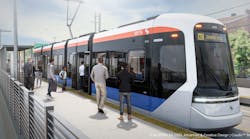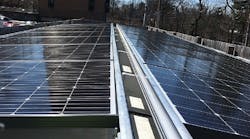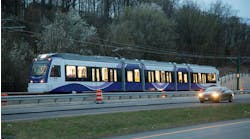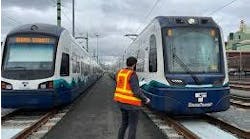The Southeastern Pennsylvania Transportation Authority (SEPTA) has signed a contract with Alstom to deliver 130 full low floor electric streetcars valued at more than €667 million (US$ 718.2 million), with options to build an additional 30 streetcars. The agreement calls for the delivery of fully customized, sustainable, next-generation Citadis light-rail vehicles (LRVs), specifically designed for North America and made to navigate the streets of Philadelphia.
The new Citadis streetcars will provide an energy-efficient mobility solution that utilizes state-of-the-art, service-proven traction technology and offers a 20 percent reduction in energy consumption compared to a standard light-rail solution. Additionally, energy efficiency is achieved by integrating LED lights and sensor-based air-conditioning, and each vehicle is 99 percent recyclable at the end of its 30-year lifespan.
"We are proud to be selected by the Southeastern Pennsylvania Transportation Authority to build and supply 130 next-generation LRVs," said President and CEO of Alstom Americas, Michael Keroullé. "The new Citadis streetcars will bring more efficient accessible and equitable service to the people of Philadelphia’s metropolis.”
The cars will feature 100 percent full low floors with wider aisles to facilitate passenger movement and accessibility, ramps at all doors for disabled access, audio and visual messaging systems to inform and communicate upcoming stops and service changes to passengers and metro-style seating characterized by flexible interiors that accommodate larger items while adjusting to capacity, demand and need, as well as designated spaces for wheelchairs, walkers, strollers and bicycles.
SEPTA’s seven trolley lines run for 68 miles and connect communities in west, southwest and north Philadelphia and Delaware County directly with the region’s two largest employment and healthcare centers, Center City and University City. The current trolley vehicles have served riders since the early 1980s.
The streetcars will be manufactured in the United States at Alstom’s Hornell facility in upstate New York, which has years of proven experience and the established capabilities necessary to meet “Buy America” requirements. Alstom has invested extensively in the Hornell site over the past few years, including the construction of a stainless-steel car body shell manufacturing facility to localize car body shell production, which will provide greater quality control over the entire production process for SEPTA.





